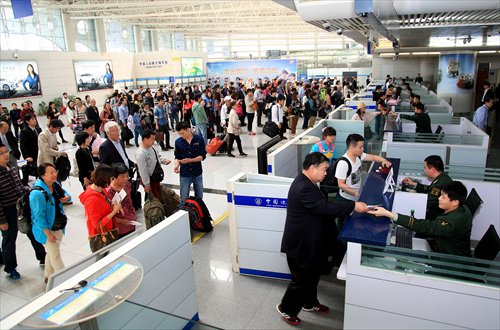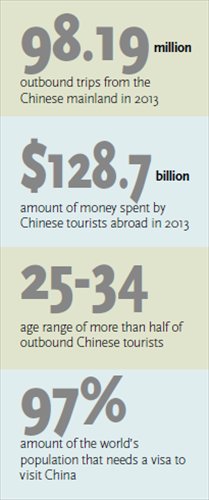More and more Chinese travel abroad while numbers of overseas visitors to China decline

Employees of the South Korea National Tourism Organization, dressed as traditional characters, welcome Chinese tourists at Incheon International Airport, South Korea, on January 31. Photo: CFP
On October 28, Tunisia announced that Chinese tourists traveling as a group will not need to apply for a visa to the country as long as they each hold valid passports and hotel reservation forms.
Three days later, a ceremony launching a new joint Ireland-UK visa scheme was held in Beijing, which will allow Chinese tourists to visit both countries with only a single visa.
These programs make up just a small part of the efforts that countries eager for Chinese visitors have made to attract visitors from China. These countries have all recognized the economic benefits that millions of Chinese tourists can bring.
The rise of the middle class in Asian countries is the largest factor contributing to global tourism growth, according to David Scowsill, CEO and president of the World Travel and Tourism Council (WTTC).
"Once you have enough disposable income to buy your refrigerator and your car, then you start to travel domestically and, ultimately, you start to travel internationally," Scowsill told the Global Times.
According to statistics released by the China Tourism Academy (CTA) under the China National Tourism Administration, the number of outbound trips from the Chinese mainland totaled 98.19 million last year, up by 18 percent since 2012. Chinese tourists spent $128.7 billion abroad in 2013.
Since 2012, China's spending on international travel has surpassed that of Germany and the US, meaning that the country's tourists spent, in total, the most on vacations of any country in the world.
But on the other hand, the number of tourists visiting China has declined, and the CTA estimated that China's tourism services trade deficit would surpass $100 billion this year, much more than 2009's deficit of $2.3 billion.

Travelers line up for their flights in Qingdao, Shandong Province on April 30 during the Labor Day holidays. Photo: CFP
Visa relaxation
This year, several countries - including France, Italy and Britain - have further simplified their visa application procedures for Chinese visitors.
Besides upgrading, renovating and expanding 12 visa application centers in China, the UK authorities have also made applying for a visa easier. A new visa website was launched in early July with guidance in simplified Chinese and all fees displayed in Renminbi.
In an e-mail interview with the Global Times, Dominique Hardy, regional manager of China and North Korea for the UK visas and immigration service, said that the UK also requires fewer supporting documents than some other European countries and now accepts photocopies of key documents.
"We've provided more translated guidance. We've produced short videos available on Youku to explain the processes. And we also now offer more customer service options, including a free e-mail service which offers advice in local languages," Hardy said.
The UK has also expanded its range of visa services, including out-of-hour appointments and the ability to pay to have your application processed more quickly.
According to Hardy, the UK received 291,919 visa applications last year, a 39 percent increase since 2012, and 96 percent of applications were successful. And they are seeing further growth this year - driven in part by China.
Apart from loosening visa controls, some countries have adopted other measures to attract Chinese visitors, such as promoting their country on Weibo, erecting road signs in Chinese and offering more Union Pay card readers in stores.
According to media reports, some countries, like Russia and the United Arab Emirates, are adapting their hotels to be more friendly to Chinese tourists by changing menus to suit the Chinese palate and hiring staff who can speak Chinese.
The Paris Police's website is navigable in Chinese. In early May, France's interior ministry said that they planned to invite policemen from China to help patrol Paris in the summer, in an attempt to ease worries over the number of Chinese tourists in the city that have been the victims of theft, although they later abandoned the plan.
Wolfgang Georg Arlt, a professor of tourism management and director of the China Outbound Tourism Research Institute at the West Coast University of Applied Sciences, Germany, thinks that visa-free entry is the best way to attract Chinese visitors.
Currently, 81 destinations offer Chinese visitors visa-free access or visas on arrival.
He cited the example of Mauritius, which from October 31 last year provided Chinese tourists with visa-free access to the country for 30 days. In addition, following the opening of direct flight routes between Mauritius and China flying out of Beijing, Shanghai, Hong Kong and Shenzhen, a new direct flight route from Chengdu is being planned.
In addition, he said Chinese travelers have their own unique needs and expectations which means that they are attracted to different kinds of attractions than visitors from more traditional tourism markets.
"In Portugal, the Chinese visit not for the beaches, like British or German visitors, but to visit historical sites. This kind of tourism is viable in seasons other than summer," Arlt said.
"The money they [Chinese tourists] spent overseas last year was enough to buy three to five aircraft carrier formations," CTA president Dai Bin remarked during the release of the academy's annual report on China's outbound tourism development in June.
The report showed that more than half of China's outbound tourists are between the ages of 25 and 34. It also showed that many of the tourists came not only from major cities like Beijing, Shanghai and Guangzhou and coastal areas, but also from second- and third-tier cities and inland regions.
"Seeing the huge business opportunities brought by the fast-growing Chinese market, nearly every economy, from the US, EU members, Australia, South Korea to South Africa and Argentina, all put developing tourism forward as a key issue during high-level visits and economic exchanges with China," Dai said.
While many are delighted by the influx of Chinese visitors, some people are resentful. According to an April report by the Chiang Rai Times, a Thailand-based newspaper, a survey conducted by Thailand's Chiang Mai University showed that 80 percent of 2,200 respondents in Thailand's second largest city were displeased with Chinese tourists.
On social media, some Thais have displayed anger at Chinese tourists for spitting, littering, cutting into lines, flouting traffic laws and allowing their children to relieve themselves in public pools.
Such complaints are not unique. In 2012, Thierry Gillier, a French fashion designer who founded the Zadig and Voltaire label, outraged Chinese people when he told the Women's Wear Daily that his new Parisian boutique hotel "won't be open to Chinese tourists." He later made an apology.
In September last year, the Chinese government published a 64-page "Guidebook for Civilized Tourism" with a long list of "do nots," including talking loudly in public, jumping lines and wasting food.

China missing out
However, the number of tourists visiting China has declined since 2011. The number of visitors who came to the country for sightseeing and leisure was 10.12 million last year, a drop of 1.5 million since 2012.
"Crowded attractions and hotels in China, especially during national holidays, as well as conflicts with neighboring countries like Japan, have put people off visiting China," Vera Wang, an analyst at the market research firm Euromonitor, told US business channel CNBC.
High levels of air pollution, a stronger yuan and a weak global economic recovery were also cited as reasons for the decline in visitors to China. According to Euromonitor, international visitors to Beijing and Shanghai declined by 10 and 6 percent, respectively, last year.
This has been noticed by Chinese specialists and officials. Since last year, China has had a 72-hour visa-free policy for all international transit passengers who arrive in 10 major cities.
Scowsill thinks China is still not accessible enough. "97 percent of the world's population still need a visa to enter China - that is the highest number out of any APEC country. China has a score of 3 on the UNWTO Visa Openness index (a score of 100 would be the most open). This is the lowest of all the APEC economies," Scowsill told the Global Times.
While many specialists suggest that China loosen its visa regulations and implement a tax refund program, some have said that the authorities need to update their conceptions of what services travelers expect.
According to the Travel & Tourism Competitiveness Report - which analyzed tourism in 144 countries - released by the World Economic Forum, China's natural sightseeing resources were ranked fifth best in the world and the country's cultural resources were ranked 15th. But when it came to the country's sightseeing/leisure facilities and overall friendliness, China was behind more than 100 other countries in the rankings.
"Do not sell China as just 'the Forbidden City, the Great Wall and pandas.' Most important or rich people on the planet have already visited Beijing in the last 20 years, and the big cities have an image of being polluted, overcrowded and expensive," according to Arlt.
"[The government should] sell China to repeat visitors, show that China is bigger and has more diverse attractions than just the big cities and the main sights. They should concentrate on bringing Western tourists close to the people through home-stays and nature excursions," he told the Global Times.
Newspaper headline: Deficit of tourism